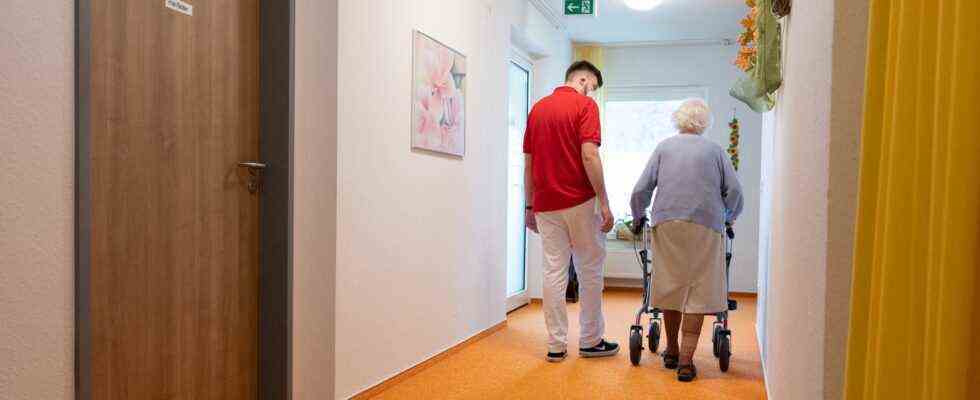Status: 19.12.2021 9:15 a.m.
A year ago Corona also raged in the “Haus im Schelmenholz” in Winnenden near Stuttgart. The vaccination has prevented worse things since then – but the virus continues to dominate everyday life in the nursing home.
“It has become so quiet,” says Dorothea Schmidt, fighting back tears. In front of her is a plate with a cake. The other seats at your table in the breakfast room are unoccupied. Two weeks ago there were “two cases” again in her living area. Again the virus has found its way through all security gates to the “Haus im Schelmenholz” in Winnenden.
For the residents in the hallway, this means quarantine again: no more community life in the hallway, all meals individually in the room. Those who receive regular visitors are happy. But Dorothea Schmidt’s daughter only comes once a week. For the old lady in a wheelchair, Corona means one thing above all: “loneliness”. Then her eyes get wet again.
Lena Reppekus knows how much even small restrictions in everyday life can cloud the mood in the hallway. The nurse has lived with this tension for almost two years: the strict hygiene and distance rules on the one hand, and the worry that old people will lose their courage to live on the other. The doorbell rings almost continuously in the team room. That can mean an emergency or just the desire to be accompanied when going to the bathroom. And often it’s just the longing to see a familiar face in the room – even if only behind the mask.
Nursing specialist Lena Reppekus and resident Dorothea Schmidt admire the Christmas tree in the house.
Image: Arnd Henze / WDR
Lack of understanding about measures and decisions
Almost all residents have now been boosted, and the staffing rate is also well above average. This may also be due to the fact that the Christmas season a year ago is still in everyone’s bones. Corona raged throughout the home. In the end, 16 residents died, one nurse was in the intensive care unit for weeks and still suffers from the long-term effects.
In the vaccination phase at the beginning of the year, there were therefore great hopes for it. Nobody understands that the booster vaccinations started much too late when you ask. Also not that in Baden-Württemberg the 2G rule for entering homes will only apply from next week. After all, it’s not just about close relatives, but also about hairdressers, physiotherapists and other external service providers who could bring the virus into the home, explains Reppekus. Therefore, she thinks that a mandatory vaccination for care facilities is correct, but the mandatory vaccination for everyone would be more important. “That’s only fair and just,” she says.
Professional ethos versus being overwhelmed
Home manager Kristina Baumstark is convinced that the majority of the team think that way. After all, the vaccination rate in the team is over 85 percent. For some, the compulsory vaccination may also mean a face-saving way to get vaccinated after all. Nevertheless, there will be conflicts: “There will probably also be a few layoffs.”
Baumstark came to care through a voluntary social year and learned the profession from scratch. She knows that sometimes she has to urge her co-workers to stay home for a few days when they are exhausted. Because as great as the frustration among caregivers is: not to let residents and colleagues down is so much part of the professional ethos that the limit to chronic excessive demands is quickly disregarded.
Sigrid Bubeck also perceives increasing tension among the staff – and at the same time raves about the loving care that her demented husband receives in the home. Now she visits him every day, feeds him, helps with his body care and tells him about relatives and old friends. She has reduced many social contacts to keep the risk for her husband, with whom she has been married for 54 years, as low as possible. This is one of the reasons why vaccination is finally required: “It didn’t work out voluntarily.”
“The limits have already been exceeded”
Bernhard Schneider sometimes has to curb his anger professionally. As the managing director of the Evangelical Home Foundation in Württemberg, he is not only responsible for the “Haus im Schelmenholz” in Winnenden, but also for 89 other nursing homes. Whether testing, vaccination or elaborate visiting regulations: The home foundation was often ahead of the tedious decision-making processes of politicians and authorities with their own solutions. That took a lot of strength and brought the staff to the limit.
Schneider can prove this in numbers: The mountain of unpaid overtime has tripled among the 9,300 employees since the beginning of the pandemic. No wonder that the fourth wave of illness has risen significantly: “People sacrifice themselves for their work. But there are limits, and they have already been exceeded.”
In the “Haus im Schelmenholz”, Lena Reppekus pushes Dorothea Schmidt’s wheelchair into the large chapel. A year ago there could be no Christmas party due to the large corona outbreak. Now the living groups celebrate separately and at a distance over four days. That means extra work for the staff. But for the residents on the third floor, it is the first reunion with the roommates after two weeks of quarantine. The Christmas mood is still hesitant – instead of the joy of seeing each other again, it seems as if you have to get used to others again. Where before Corona was sung loudly with “Oh, Du Fröhliche”, today only a few shy voices can be heard from behind the masks.

